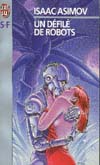Hardback edition
A classic collection of eight short stories and two full-length novels—all about robots and robotics—completing the entire library of Asimov robot writings begun in I, Robot.
At first they were simple, unthinking machines victimized by frightened men suffering from a “Frankenstein complex.” Later, as the technology advanced, they became capable of independent action. In eight short stories and two novels, master storyteller Isaac Asimov traces the development of positronic robots with brains of platinum-iridium.
Sensible, non-mephisophelian robots designed by engineers and not pseudo-men created by blasphemers, Asimov’s robots revolutionized the field of science fiction. All the more fascinating because they are not supernatural creatures but precision engineered machines, the positronic robots react along rational lines that exist in their brains from the moment the last rivet is in place and the last electrical connection has been made.
Paperback edition
The Bible of Robotics
I. A robot may not injure a human being, or, through inaction, allow a human being to come to harm.
II. A robot must obey all orders given by human beings except where such orders would conflict witht he First Law.
III. A robot must protect its own existence as long as such protection does not conflict with the First and Second Law.
Why then did man hate them?
Robot MA-2 abandoned its owner in a deadly storm…Robot LNE/Pr broke a man’s arm with one blow…Robot EZ-27 ruined a scholar’s life work and disgraced him forever…
Why did the robots hate man?
Isaac Asimov’s prophetic science fiction powerhouse!
This book is available in two forms. The full form of the book is available only in hardback and is long out of print. It consists of eight short stories and the full text of The Caves of Steel and The Naked Sun. More generally available is the paperback edition, Eight Stories From the Rest of the Robots, which consists of just the shorter works. (The paperback edition goes in and out of print and was available fairly recently, even if it isn’t currently in print.) Anybody who owns the shorter version—as did I until not long ago—and the two novels separately basically has the full text of the hardback edition less the introductions to the two novels.
As for the eight short stories themselves, they vary in quality, running from “First Law" and “Let’s Get Together", which are fairly uninteresting but not offensively so, up to “Galley Slave", which was Asimov’s favorite Susan Calvin story at least through the 1960’s, and my favorite as well. (I'm a sucker for courtroom dramas, and this one is very well done.) I'm also very fond of “Victory Unintentional" and “Satisfaction Guaranteed"—the former is one of Asimov’s best attempts at humor, and the latter has a delightful twist to it. “Lenny" I do not particularly care for; “Robot AL-76 Goes Astray" is mildly amusing (although I enjoyed it much more as a teenager than I do now), and “Risk" is actually fairly forgettable for some reason.
The overall effect is rather middle-of-the-road. This collection is worth having for the sake of “Galley Slave" alone—but if one already owns a copy of “Galley Slave", “Satisfaction Guaranteed", or “Victory Unintentional", there’s no real need to have the other five stories tag along.
In particular, there are none of the short stories here which aren’t in The Complete Robot, and the introductions aren’t all that interesting. The owner of The Complete Robot, then, should have no real need to get this volume, except to fill out a collection.
Contents
 |
“Robot AL-76 Goes Astray“” |
 |
“Victory Unintentional“” |
 |
“First Law“” |
 |
“Let’s Get Together“” |
 |
“Satisfaction Guaranteed“” |
 |
“Risk“” |
 |
“Lenny“” |
 |
“Galley Slave“” |
  |
“The Caves of Steel” |
  |
“The Naked Sun” |


